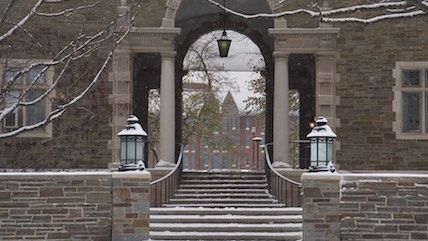Cornell University Students Vote Against Intellectual Diversity, on Grounds It Would Harm Diversity
The movement to convince college students they are victims of systemic oppression appears to be winning on all fronts.


The dominant campus narrative these days is that left-leaning students make themselves out to be victims, and the evidence suggests this concern is warranted.
But what about conservative students? They are, after all, a minority group at elite college campuses, and often complain (rightly, in some cases) that their institutions are actively hostile toward their views and activities.
A recent op-ed in The New York Times, written by Aaron Hanlon—a former conservative student who became a liberal English professor at Colby College—warns the campus right-of-center that they are doing themselves a disservice by pretending to be victims.
"What I'm getting at is that I was never a victim," writes Hanlon. "My message to conservative students is that neither are you. The leaders and pundits who say otherwise are doing you a disservice. Sure, they're getting a lot of clicks and selling ads by framing your struggle as one of an embattled minority silenced by the overbearing liberalism of academia, but that false equivalence is not helping you prepare for the wider world."
More on Hanlon's point in a minute.
First, let me draw your attention to some recent news out of Cornell University, where the Student Assembly considered a resolution that would call for a committee to look into the matter of whether the campus lacks ideological diversity. The resolution cites the fact that 96 percent of Cornell faculty political donations are given to left-of-center candidates and causes as evidence of a problem.
Note that the resolution did not actually call for some kind of intellectual-diversity-affirmative-action, which would likely be ill-conceived and harm the university's ability to make good hiring decisions. Nor would the resolution have created an actual committee. It merely calls on the faculty to consider creating a committee, in order to study the issue of ideological diversity at Cornell.
"Common sense and research indicate that it is students on the left who have the most to gain from [exposure to different ideas]," New York University psychologist Jonathan Haidt told The College Fix, in support of the resolution, "and the most to lose from spending four formative years in a politically homogeneous institution."
The resolution was defeated. The vote was tied 10-10, and SA's president dealt it the killing blow.
A conservative student who attended the meeting told The Cornell Review that the chief complaints about the resolution were this:
(1) conservatives have not been historically oppressed as have other groups; (2) spending resources on intellectual diversity diverts resources from promoting other forms of diversity; and (3) conservative students are free to speak out in class if they find something disagreeable or wish to argue their own point of view.
Point one is probably true, though it certainly depends: I'd imagine that some of the most conservative students come from socioeconomically disadvantaged, rural backgrounds. And point three is also true, though some conservatives evidently feel that their professors will retaliate against them if they speak up (though they could be wrong about this—feelings are not facts).
But point two seems suspect, unless you believe that any and all attention being paid to intellectual diversity would be better spent on some other kind of diversity. It certainly sounds like liberal students are looking out for their own narrow ideological self-interest: no consideration of intellectual diversity, since said considerations could only decrease the overall representation of liberal orthodoxy on campus.
To return to Hanlon, is it true that conservative students are wrong to see themselves "as victims of ideological oppression," as he suggests? It's not as clear to me. They're not disadvantaged in life in general, perhaps. But they do face certain barriers on certain campuses.
That said, Hanlon is right to bemoan the rise of a "cottage industry of outrage" related to conservatives on college campuses. Whether or not their frustration stemmed from legitimate grievance, the conservative student movement is increasingly, and loudly, playing the victim—with an energy as palpable as the left's. Too many right-leaning student groups have lost interest in inviting speakers who are knowledgeable about philosophy and policy: they would rather score easy outrage points with provocateurs.
I suspect that some of this is not just a reaction to the left's hysterics, but rather, a convergence. Many of the forces that incentivize leftists to seek victim status—Title IX guidance, administrative bloat, changing ideas about safety in the K-12 system, helicopter parenting, concept creep—apply equally to rightist students.
This is all quite frustrating for those of us who want college campuses to be open to more ideas and free of hyperbolic complaints from students about how miserable and marginalized they are. But the movement to convince college students they are victims of systemic oppression appears to be winning on all fronts.


Show Comments (85)